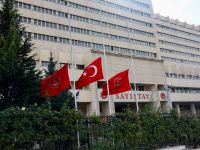The World Bank and indeed the International Monetary Fund (IMF) are increasingly showing more awareness than ever of the plight of the poor peoples worldwide, as well as of the underdeveloped world.
The recent Prague annual meeting of the IMF and the World Bank witnessed a wider and deeper recognition of the limitations of globalization and privatization by the very international monetary institutions, which are the driving force behind the restructuring of both global and state economies.
President of the World Bank James Wolfenson gave a vivid expression to this recognition when he said at the conference that he was "pleased" that there was a growing awareness around the world of such issues as equity, poverty and globalization. Wolfenson went on to say that with "20 percent of the world controlling 80 percent of global economy, the poverty problem could lead to global instability in the future."
IMF Managing Director Horst Koehler echoed similar sentiments and pledged to make cooperation, consultation, listening and learning the hallmarks of the fund's new strategy. Further evidence of shift in perspective and objectives of the World Bank and the IMF is the increasingly close collaboration between these two global financial institutions and other international organizations, which are working at the other end of development.
For example, UNDP's agenda has dramatically shifted in recent years, from strictly economic goals to human rights, including economic, social and cultural rights. It is amazing how much UNDP has tilted in favor of human rights, their protection and promotion in recent times. Few years ago, it was unheard of to see UNDP bothered so much by human rights concerns.
Other specialized international organizations, such as the World Health Organization (WHO), the International Labor Organization (ILO), UNICEF and UNESCO are increasingly showing more awareness of human rights and accord them more recognition.
When Jordan's second periodic report to the UN Committee on Economic, Social and Cultural Rights was considered last August in Geneva, the committee members asked the Jordanians point-blanc whether the Kingdom's government was sufficiently aware of its treaty obligations under the International Covenant on Economic, Social and Cultural Rights when it negotiated with the World Bank and the IMF and agreed to a set of economic restructuring recommended by these two international financial institutions.
The answer of the Jordanian delegation was in the negative but the Jordanian delegation went on to add that henceforth the Jordanian authorities would be asked to stay abreast of the government's treaty obligations in a bid to making sure that they are taken into full consideration in all future talks with various international institutions.
Recent surveys conducted in many developed countries show that multinational corporations are not aware of their respective governments' human treaty commitments when drawing their economic and financial strategy plans. Many CEOs also voiced concern about the implications of these internationally binding obligations and feared that considerable litigation may arise from them.
The explanation is obvious: these human rights commitments can be invoked in a court of law either by a class action or by individuals claiming violation of their human rights. The total picture that one gets from the private and public sectors worldwide is that the message of human treaty obligations has yet to imprint in the minds of governments and the private sector the urgent need to heed human rights dimensions in their policies and practices.
I wonder if our own authorities are fully aware of their obligations under the International Covenant on Economic, Social and Cultural Rights. If they are not, it is high time that they become so. Educating our policy makers on economic developments along these lines appears absolutely necessary, given the acknowledgement that we in Jordan, whether at the public or private level, are nowhere near recognizing our human rights treaty obligations. — ( Jordan Times )
Walid M Sadi
© 2000 Mena Report (www.menareport.com)








